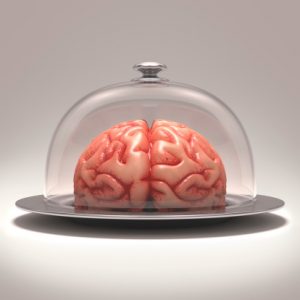 Unhealthy diets containing junk food have been shown to affect the brain and lead to poor mental health. The findings come from researchers at Deakin University and the Australian National University.
Unhealthy diets containing junk food have been shown to affect the brain and lead to poor mental health. The findings come from researchers at Deakin University and the Australian National University.
Specific findings concluded that a part in the brain – the hippocampus – has been shown to be smaller in those who consume junk food. The hippocampus is responsible for learning, memory and mental health.
Advertisement
Researchers used MRI scanning to measure the size of the hippocampi in Australian adults between the ages of 60 and 64. Diet and other factors which could affect the hippocampus were measured and taken into account as well.
The results, published in BMC Medicine, revealed that seniors who consume junk food are more likely to have smaller left hippocampi. On the other hand, seniors who consume more nutrient-rich foods have larger left hippocampi.
Associate Professor Felice Jacka said, “Mental disorders account for the leading cause of disability worldwide, while rates of dementia are increasing as the population ages. Recent research has established that diet and nutrition are related to the risk for depression, anxiety and dementia; however, until now it was not clear how diet might exert an influence on mental health and cognition.”
Once again we see another study which highlights the importance of eating well; nutrition and diet play a large role in all aspects of health – brain size included.
Effects of lifestyle choices on brain size
 Now that we know that eating poorly affects brain size, there are negative effects which can result in a smaller brain. Other lifestyle choices can also impair brain size, like smoking and being overweight. Research has revealed the negative consequences poor lifestyle choices have on our brain health, such as:
Now that we know that eating poorly affects brain size, there are negative effects which can result in a smaller brain. Other lifestyle choices can also impair brain size, like smoking and being overweight. Research has revealed the negative consequences poor lifestyle choices have on our brain health, such as:
- Impaired cognitive ability in those with heart disease
- Smokers have worsened memory in comparison to non-smokers
- Smoking and diabetes are linked to cognitive decline
This goes to show that we should also continue to embark on other healthy lifestyle choices if we want to maintain memory and cognitive ability. Thus not smoking, controlling or preventing diabetes and preventing heart disease and obesity are all important aspects of health.
Effects of junk food on brain health
 Our brain changes when we consume junk food. For starters, we can very well become addicted to it – especially food containing sugar. Other effects of junk food on brain health include:
Our brain changes when we consume junk food. For starters, we can very well become addicted to it – especially food containing sugar. Other effects of junk food on brain health include:
Brain damage: Junk food does not properly nourish our brains. Our body needs adequate and proper nutrition in order to work – brain included. Many nutrients work to boost brain health, for example, the nutrients found in fish or olive oil have been shown to reduce the risk of dementia. When we continue to consume junk food our brains become starved thus resulting in brain damage.
Mental health disorders: Junk food disrupts the signals in the brain which make us feel happy. Not consuming the right nutrition can leave us feeling depressed, anxious, or lead to ADHD or even schizophrenia.
Cognitive ability: Overconsumption of calories can result in the brain being unable to produce healthy synapses – responsible for learning and memory. Therefore, constantly consuming high calorie meals – typically found at fast-food restaurants – can result in impaired learning and poor memory.
Best brain foods
 The easiest way to protect your brain from damage, mental health disorders and preserve your learning ability is to eat well. Below is a list of the best brain foods which you should consume if you want a healthy brain for years to come.
The easiest way to protect your brain from damage, mental health disorders and preserve your learning ability is to eat well. Below is a list of the best brain foods which you should consume if you want a healthy brain for years to come.
- Whole grains
- Oily fish
- Berries
- Tomatoes
- Blackcurrant
- Pumpkin seeds
- Broccoli
- Sage
- Nuts
Incorporating these brain foods into your diet and eliminating the junk means you won’t have to worry about learning new things or forgetting a loved one’s birthday any longer.
Related Reading:
Seniors: Exercise boosts brain health
Advertisement
Researchers at the University of Kansas Medical Center have shown that seniors can greatly benefit from exercise when it comes to boosting brain health. With this study researchers wanted to know how much exercise was needed to improve the cognitive function. Continue reading…
Type 2 diabetes impairs brain function
Harvard researchers have linked inflammation and reduction in blood flow to the brain in those with Type 2 diabetes with reduced cognitive function. Type 2 diabetes remains prevalent in the American population. Continue reading…
Sources:
http://medicalxpress.com/news/2015-09-junk-food-brain
http://www.bbcgoodfood.com/howto/guide/10-foods-boost-your-brainpower
http://healthyeating.sfgate.com/relationship-between-fast-food-brain
https://www.psychologytoday.com/blog/the-athletes-way/201305/lifestyle-choices-can-cause-your-brain-shrink
